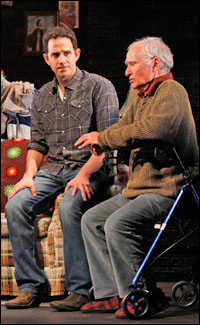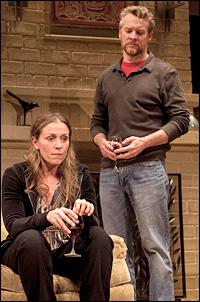
But Lincoln Center Theater shook its head at the suggestion. The production did not officially open at the Mitzi E. Newhouse Theatre until January 2011 (previews began in December 2010), and was thus not eligible for the 2011 Pulitzer Prize for Drama. Pulitzer rules clearly stated, "Productions opening in the United States between Jan. 1, 2010 and Dec. 31, 2010 are eligible."
A year has passed — the 2012 Pulitzers and finalists in a number of literary and journalistic divisions get announced April 16 — and now it looks like it may now be Robbie's turn. (Baitz is known to his intimates by that diminutive.) And, as luck would have it, the play is still running. Other Desert Cities transferred to Broadway on Nov. 3, 2011, where it still plays. So if the Pulitzer jurors (who make the recommendations) and the Pulitzer judges (who choose the winner) want to refresh their memory as to the quality of the script, they have ready access to the living, breathing premiere production. Remember what a last-minute visit by the judges to the un-recommended Next to Normal did to the 2010 race?
Should Baitz win, the honor will be long in coming for the one-time golden boy of the American theatre. The dramatist's talent has been critically praised since The Film Society bowed in 1987. But, a quarter century and a dozen plays later, his career has been more roller-coaster that steady incline. The closest he came to the Pulitzer was in 1996, when A Fair Country, one of Baitz's best-regarded plays, was a finalist for the prize. Other Desert Cities is, in fact, the first Broadway play for Baitz, who is now 50.
Nearly every one of the dozen critics, press agents and pundits who were polled for this article assumed Other Desert Cities was running well ahead of the pack. And those who didn't assume that thought the play had been eligible in 2011. As one observer commented, "The more interesting guessing game [this year] is who will the finalists be."
| |
 |
|
| Santino Fontana and Yusef Bulos in Sons of the Prophet. | ||
| photo by Joan Marcus |
Sons, by Stephen Karam, is a loosely structured, contemplative look at a Lebanese-American Pennsylvania family struggling to contend with the confusing, comic-tragic hand fate has dealt them. Critics lauded it for its humane voice and refusal to offer easy answers. It was produced Off-Broadway by the Roundabout Theatre Company last fall and proved one of the bright spots of the first half of the theatre season.
4000 Miles, by Amy Herzog, is a gentle, warm drama about a troubled young man who crashes at the Manhattan apartment of his aged grandmother to piece together the parts of his recently shattered life and world view. Critics found Herzog's naturalistic tapestry touching, compassionate and authentically felt. Opening last summer at the Duke on 42nd Street, the work was a surprise critical hit. Lincoln Center Theater, the producer, recently reopened it at the larger Newhouse.
But, wait! — here we go again. A Lincoln Center spokesman said 4000 Miles will be submitted for the calendar year 2012 so it won't be eligible for the award that's announced this month. One guesses LCT doesn't want to pit two of its Pulitzer-bait properties against one another.
| |
 |
|
| Frances McDormand and Tate Donovan in Good People. | ||
| Photo by Joan Marcus |
The Pulitzer Prize is administered by Columbia University. The Drama prize is "for a distinguished play by an American author, preferably original in its source and dealing with American life." The recipient gets $10,000.
*
The complete list of Pulitzer Prize in Drama winners is listed below: 2011: Clybourne Park by Bruce Norris
2010: Next to Normal by Tom Kitt and Brian Yorkey
2009: Ruined, by Lynn Nottage
2008: August: Osage County, by Tracy Letts
2007: Rabbit Hole, by David Lindsay-Abaire
2006: No award
2004-05: Doubt, by John Patrick Shanley
2003-04: I Am My Own Wife, by Doug Wright
2002-03: Anna in the Tropics, by Nilo Cruz
2001-02: Topdog/Underdog, by Suzan-Lori Parks
2000-01: Proof, by David Auburn
1999-00: Dinner with Friends, by Donald Margulies
1998-99: Wit, by Margaret Edson
1997-98: How I Learned To Drive, by Paula Vogel
1996-97: No award
1995-96: Rent, by Jonathan Larson
1994-95: The Young Man From Atlanta, by Horton Foote
1993 94: Three Tall Women, by Edward Albee
1992-93: Angels in America: Millennium Approaches, by Tony Kushner
1991-92: The Kentucky Cycle, by Robert Schenkkan
1990-91: Lost in Yonkers, by Neil Simon
1989-90: The Piano Lesson, by August Wilson
1988-89: The Heidi Chronicles, by Wendy Wasserstein
1987 88: Driving Miss Daisy, by Alfred Uhry
1986-87: Fences, by August Wilson
1985-86: No award
1984-85: Sunday in the Park With George, by James Lapine and Stephen Sondheim
1983-84: Glengarry Glen Ross, by David Mamet
1982-83: 'night, Mother, by Marsha Norman
1981 82: A Soldier's Play, by Charles Fuller
1980-81: Crimes of the Heart, by Beth Henley
1979-80: Talley's Folly, by Lanford Wilson
1978-79: Buried Child, by Sam Shepard
1977-78: The Gin Game, by D.L. Coburn
1976-77: The Shadow Box, by Michael Cristofer
1975-76: A Chorus Line, by Michael Bennett, James Kirkwood, Nicholas Dante, Marvin Hamlisch and Edward Kleban
1974-75: Seascape, by Edward Albee
1973 74: No award
1972-73: That Championship Season, by Jason Miller
1971-72: No award
1970-71: The Effect of Gamma Rays on Man-in-the-Moon Marigolds, by Paul Zindel
1969-70: No Place To Be Somebody, by Charles Gordone
1968-69: The Great White Hope, by Howard Sackler
1967-68: No award
1966 67: A Delicate Balance, by Edward Albee
1965-66: No award
1964 65: The Subject Was Roses, by Frank D. Gilroy
1963-64: No award
1962-63: No award
1961-62: How To Succeed in Business Without Really Trying, by Abe Burrows and Frank Loesser
1960-61: All the Way Home, by Tad Mosel
1959-60: Fiorello!, by Jerome Weidman, George Abbott, Sheldon Harnick and Jerry Bock
1958-59: J.B., by Archibald MacLeish
1957-58: Look Homeward, Angel, by Ketti Frings
1956-57: Long Day's Journey Into Night, by Eugene O'Neill
1955-56: The Diary of Anne Frank, by Frances Goodrich and Albert Hackett
1954-55: Cat on a Hot Tin Roof, by Tennessee Williams
1953-54: The Teahouse of the August Moon, by John Patrick
1952-53: Picnic, by William Inge
1951-52: The Shrike, by Joseph Kramm
1950-51: No award
1949-50: South Pacific, by Richard Rodgers, Oscar Hammerstein II and Joshua Logan
1948-49: Death of a Salesman, by Arthur Miller
1947-48: A Streetcar Named Desire, by Tennessee Williams
1946-47: No award
1945-46: State of the Union, by Howard Lindsay and Russel Crouse
1944-45: Harvey, by Mary Chase
1943-44: No award
1942-43: The Skin of Our Teeth, by Thornton Wilder
1941-42: No award
1940-41: There Shall Be No Night, by Robert E. Sherwood
1939-40: The Time of Your Life, by William Saroyan
1938-39: Abe Lincoln in Illinois, by Robert E. Sherwood
1937-38: Our Town, by Thornton Wilder
1936-37: You Can't Take It With You, by Moss Hart and George S. Kaufman
1935-36: Idiot's Delight, by Robert E. Sherwood
1934-35: The Old Maid, by Zoe Akins
1933-34: Men in White, by Sidney Kingsley
1932-33: Both Your Houses, by Maxwell Anderson
1931-32: Of Thee I Sing, by George S. Kaufman, Morrie Ryskind and Ira Gershwin
1930-31: Alison's House, by Susan Glaspell
1929-30: The Green Pastures, by Marc Connelly
1928-29: Street Scene, by Elmer Rice
1927-28: Strange Interlude, by Eugene O'Neill
1926-27: In Abraham's Bosom, by Paul Green
1925-26: Craig's Wife, by George Kelly
1924-25: They Knew What They Wanted, by Sidney Howard
1923-24: Hell-Bent fer Heaven, by Hatcher Hughes
1922-23: Icebound, by Owen Davis
1921-22: Anna Christie, by Eugene O'Neill
1920-21: Miss Lulu Bett, by Zona Gale
1919-20: Beyond the Horizon, by Eugene O'Neill
1918-19: No award
1917-18: Why Marry?, by Jesse Lynch Williams
1916-17: No award
For more information, visit pulitzer.org.
Follow Robert Simonson on Twitter at @RobertOSimonson.











